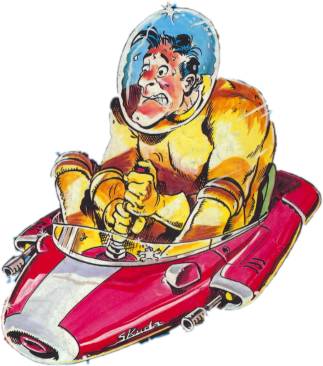Table of Contents
Thrus-Types
also known as: gravity shooters; gravitational shooters; gravitors; cave-flyers; thrust-types
Most commonly developed in Europe, Thrus-Types are games where you pilot a rotatable craft with thrusters in back (think Asteroids) while constantly fighting the pull of gravity (and, often, and the craft's inertia). Common elements include carrying heavy objects, fragile ships, precision landing, limited fuel, and player-destroyable fuel refills.
This seems to be a popular genre amongst hobbyist programmers, possibly because of the interesting coding challenges it presents.
Lineage
Thrust-types can be considered one of the earliest videogame genres. Both Spacewar! and Lunar Lander had thrust-based gameplay and their original incarnations predate the year 1970.
Gravitar (1983) and Gauntlet (1984) created many of the genre's conventions. However it wasn't until Thrust (1986) was released (and ported to every home computer out there) that the genre gained some popularity.
Gravity Force 2 (unofficial sequel to Gravity Force) popularized multiplayer Thrust-Types, and spawned many clones for the Amiga and from the Finns, such as TurboRaketti, AUTS, Super PakPak, and a dozens of games with “Gravity” in their titles.
Examples
General
- Comet Racer (2009, browser)
- Fathom
- Fleuch 2.0
- Fly Harder
- Gauntlet (1984, no relation to the popular arcade game)
- Gravitar
- Graviton
- Graviton 2 Official site Forum thread
- Gravity Crash
- Gravity Force
- Oids
- Rotor
- S.T.I.N.G. (NES homebrew) Nesdev forum thread
- Sub-Terrania (Genesis/Mega Drive, objective-based missions, has retro-thrusters)
- TerraFire
- Thrust (originally for the BBC Micro and Acorn Electron)
- Thrust II (open world)
- Virus (name of various ports of Zarch)
- Zarathrusta Video (uploaded by the game's coder)
- Zarch (fast 3D from 1987!) Video
VS. Multiplayer
- A2: The Ultimate Sequel To AUTS - The Ultimate Stress Relief Game
- Assault Wing
- AUTS - The Ultimate Stress Relief Game
- Bratwurst (uses scalable vector graphics to avoid the need for split-screen)
- Gravity Force 2
- Gravity Power
- Rocket Chase
- Spacewar!
- Super PakPak (NES homebrew) Nesdev Wiki page
- TurboRaketti II
- V-Wing
- X-Pilot (open source) Official site
Lunar Lander clones
The original Lunar Lander, simply called Lunar, was designed by a 17 year old high school student in 1969 for the PDP-8 computer. The game was text-based, with the player entering the amount of fuel he wished to burn each “turn”. Despite being one-dimensional, the game was compelling enough for others to make clones of it. The first graphical version, called Moonlander, was made in 1973 for the DEC GT40 computer terminal and is the first version of the game to resemble what we are familiar with nowadays, with a 2D landscape and a rotatable craft.
The singular goal in most Lunar Lander-type games is to land on a flat surface on a rocky planetoid. The smaller the surface, the greater the score. Typically the game starts out with a zoomed-out view of the entire playfield, and zooms in when you're close to the surface.
- Astrolander (TimeSplitters 2 minigame)
- Candy Lander (game in Totally Tiny Arcade)
- Jupiter Lander (VIC-20/C64 game by HAL)
- Lander (Windows 3.1)
- Lander (3D, developed by Psygnosis) [move to General section?]
- Lunar Lander (various games used this title)
- as part of Videocart-23 for the Channel F
- 1979 Arcade game by Atari. Ported to:
- GBA (part of a compilation)
- Atari 2600 (for the Atari Flashback 2)
- developed by Pack-In-Video Co. for the Game Boy (JP only), added shuttle lift-off and on-foot exploration segments
- Moon Landing (part of Compile's MSX Disk Station #0 magazine type thing [TODO: research this])
- Out of This World! (slight upgrade of Space Rendezvous)
- Rocket Lander
- Space Explorer
- Space Rendezvous (Odyssey 2 game, 2-player, goal is to dock on an orbital ship)
- Space Worries (pack-in with Adventure Game Construction Kit)
- Super Lander (for the Dragon 32/64 microcomputers, has ceilings)
Offshoots
This section includes titles that have similar gravity-based gameplay but with different propulsion methods, and games that might/would qualify as thrus-types if gravity was added.
"Flappers"
- Brave Honey Bee
- Flywrench
- Joust
- When Pigs Fly
"Flappies"
A cross breeding of flappers and endless runners, which, thanks to the removal of the Vietnam-made game Flappy Bird and protest games made in response, have become quite a populated genre.
- See Flappy Jam for a list of over 700 examples!
Non-Gravitational
Though they exclude the effect of gravity, these games share Thrus-Types use of inertia. So controlling the avatars, and mastering their control, in these games has a similar satisfaction.
- Asteroids
- Descent (series)(3D)
- Forsaken (3D)
External Links
- Forty Years of Lunar Lander - Technologizer Article
